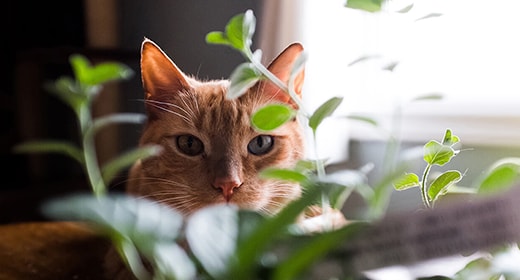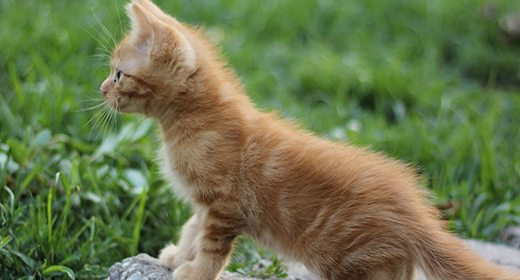

Humans aren’t the only ones affected by allergies. Like you, your adult cat can suffer from allergic reactions to any number of things in the air, on her skin and in her food. Allergies must be diagnosed and treated by a veterinarian, but first you must know what to look for.
Four of the most common types of allergies that might affect your cat are inhalant, food, contact and flea allergies.
Inhalant allergies in cats are caused by the same common allergens that affect you: dust, grass, trees, mold, pollen, ragweed and so on. They can be seasonal or persistent, and while some breeds may experience the same sniffly, sneezy symptoms humans often suffer, skin reactions are most common. Inhalant allergies can often be treated with the same medications you take, but please don’t treat your cat’s allergies without veterinary supervision.
Food allergies in cats can be the most difficult to diagnose and manage. Treatment involves a hit-or-miss approach involving a restricted diet and the gradual reintroduction of possible allergens to determine the culprit. Skin reactions to food allergies are common in cats, but frequent vomiting or diarrhea also can be a sign. Keep in mind that if your cat’s diet changes (or she just ate something she wasn’t supposed to), she may experience an episode of vomiting or diarrhea. This doesn’t necessarily mean your cat has an allergy. Watch and see if it becomes a persistent problem before scheduling a trip to the vet.
You might be surprised to learn that most cats are only vaguely bothered by fleas. But those that are allergic can suffer — and so can their owners. Contact and flea allergies generally cause skin irritation in cats and are treated topically. Cats with contact and flea allergies often chew their skin raw, leading to hair loss, odor and infection, so fastidious flea control is a must.
The most common allergy symptoms in cats are skin reactions, regardless of the cause, and they can appear at any age. Just because your cat didn’t have allergies as a kitten doesn’t mean she won’t have them as an adult. If your cat suffers from any of the following symptoms, take her to the vet for a consultation:
Allergies can vary from cat to cat, so it is important that you work with your vet to make sure your cat gets the best possible treatment. You’ll both be happier as a result.


With all of the different kitten food options and ingredients available, it’s important to learn what your kitten needs and what is less essential. You may have heard of flaxseed meal, an ingredient included in some wet cat foods. Is flaxseed meal, a source of omega-3 fatty acids, a necessity for your kitten?
Learn more about this ingredient and how it can affect your kitten’s health for the better.
Flaxseed meal is the ground seed of the flax plant. The oil in flax is a good source of omega-3 fatty acids like alpha-linoleic acid, which is the parent compound of other omega-3 fatty acids.
In kitten and cat food, flaxseed meal is used to provide omega-3 fatty acids to give a balance of omega-6 to omega-3 fatty acids in the diet. IAMS research shows that balancing the amount of omega-6 and omega-3 fatty acids helps maintain a healthy skin and coat.
Including omega-3 fatty acids like alpha-linoleic acid in a kitten’s diet can help:
Alpha-linolenic acid may be an essential omega-3 fatty acid; however, it may take several generations for the signs of deficiency to become evident in a cat. When choosing a wet food, consider one that contains flaxseed meal to help maintain your kitten’s health during this time of rapid growth and development. IAMS™ Perfect Portions™ Healthy Kitten Pate with Chicken is formulated with omega-3 sources, including flaxseed meal, to provide guaranteed levels of omega-3 fatty acids.